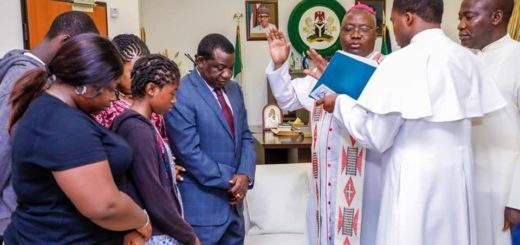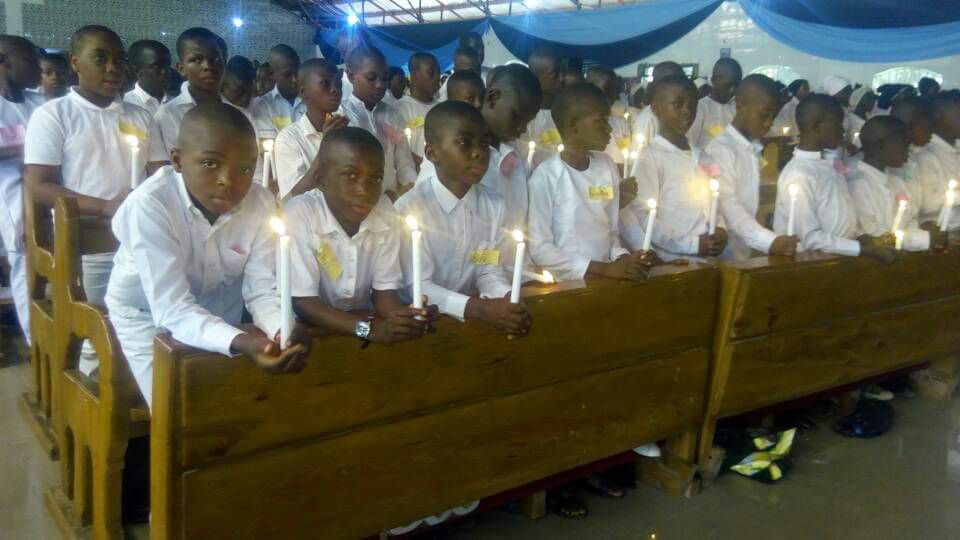Reflection on the Compassion of Jesus
by ARCH BISHOP · August 2, 2020
18th Sunday, August 2, 2020, Homily at St. Theresa’s Church, Bwari, Abuja, by Archbishop I. A. Kaigama.
Readings: Is. 55:1-3; Ps. 144(145): 8-9, 15-18; Rm. 8:35, 37-39; Mt. 14:13-21
“Jesus saw the huge crowd as He stepped out of the boat and He had compassion on them….” (Mt 14:14).
This Sunday, the compassion of Jesus is the subject of my reflection.
Compassion is the ability to understand and feel the sufferings of another person; to be able to put oneself in the shoes of other persons to know the pains they are going through. The Gospel narratives are full of such accounts about Jesus who identified with the suffering irrespective of their racial or social status. According to the letter to the Hebrews, Jesus sympathizes with us in all our weaknesses (cf. Heb. 4:15). In the Gospel today, Jesus moved by compassion, provided food for the crowd that had stayed with Him all day by multiplying the loaves of bread and fish, rather than heed the disciples’ advice to dismiss the people to go to the villages to fend for themselves.
In our world, there is a growing coldness of love and compassion reminiscent of the attitude of the priest and the Levi who came by a man who was attacked by robbers and left half-dead by the roadside and they both passed the other way and left the man unattended to (cf. Lk. 10:25-37). Jesus calls us to become sources of transmitting God’s providence and generosity to the poor, the hungry and the needy. The little we have is not too little. It is enough to go round. The disciples saw only five loaves and two fish. The widow at Zarephath saw only a handful of flour in her jar and a little oil in her jug (1 Kgs. 17:12). If in charity we give the little we have, God’s providence will multiply it for the receiver.
If sharing the little we have should be the attitude of Nigerians, Nigeria should have nothing being the so-called “poverty capital of the world”. The vast difference between the rich and the poor will not exist. The basics of life will be available to all: shelter, food, potable water, roads, electricity, education, basic health care etc.
Let the readings today about the generosity and compassion of Jesus remind us to share the little we have. Those managing public resources should ensure that what we have goes round. It is uncharitable to accumulate funds that belong to the poor or to inflate the price of contracts for projects meant to serve the public. If such is done, we end up with substandard structures and short change those for whom such projects are meant to alleviate their poverty. You can imagine how roads built through contract scam soon develop gullies, with people dying in needless accidents or buildings collapsing and killing people.
In the first reading from Prophet Isaiah, the Lord commands us all to come to Him, all who are thirsty and in want. It is an open invitation to come as you are – with all your worries and burdens, joys and sorrows, gains and losses. He commands the poor to come and receive grains to eat and to drink wine and milk (cf. Is. 55:1). This invitation is at no cost. The best things in life are free: oxygen, water, sunlight, moonlight, land etc. Nobody pays God for any of these. What is strange is that instead of enjoying these free elements, we sometimes as Pope Francis says in Laudato Si, inflict harm by their irresponsible use and abuse (#2), to the detriment of the environment and humanity.
At this Eucharistic celebration, we ask Jesus to satisfy the many people suffering physical hunger with material food and spiritually, with His body and blood, so that even amidst the trials, anguish, distress, persecution, famine, sickness and death, we should not forget the reality of God’s love that St. Paul talks about in the second reading (Rom 8). We should remain solidly rooted in faith and use the resources we have judiciously and equitably to the benefit of all. In these dark moments of the negative social consequences of the corona virus disease, we must help the needy in our own little way and the authorities must ensure that the palliatives provided by Government, faith-based or voluntary organizations and other donors are properly shared and equitably distributed to meet the needs of the poor masses. If this is sincerely done, through the intervention of Jesus, all can eat and be satisfied and even have leftovers as the twelve baskets full reported in Matthew 14:20.
I commend some of you who heeded our call to donate towards assisting the needy among us during this COVID-19 era. Through the society of St. Vincent de Paul, the Archdiocese of Abuja was able to distribute palliatives two times and hopefully, a third distribution will be done.
Let us remember however that John 6:27 says, “Do not work for the food that perishes, but for the food that endures for eternal life, which the son of man will give you”. So, as Christians, we must work with the realization that physical food can only quench bodily hunger but the food that eternally endures is the Eucharist.



